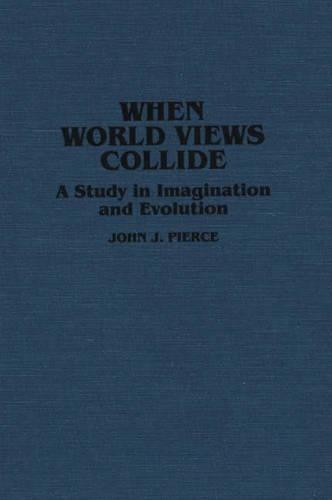
When World Views Collide: A Study in Imagination and Evolution
(Hardback)
Publishing Details
When World Views Collide: A Study in Imagination and Evolution
By (Author) John J. Pierce
Bloomsbury Publishing PLC
Praeger Publishers Inc
23rd May 1989
United States
Classifications
Tertiary Education
Non Fiction
809.3876
Physical Properties
Hardback
255
Description
Science fiction has evolved and diverged in many ways and moods. When World Views Collide is the third and final volume in a history of the genre that began with Foundations of Science Fiction and continued in Great Themes of Science Fiction. The conflicts in science fiction are conflicts about world views, which Pierce defines as fundamental beliefs about the nature of man, the universe, and man's place in the universe. Pierce presents each world view in science fiction on its own terms, as expressed in the works of its partisans. This final volume of the trilogy thus examines science fiction as a way of defining and delimiting humanity and human values, which may well be the most important aspect of the genre today. This unique and formidable study is based on a reading of much of the genre from its beginnings to its most recent publication. Pierce traces relationships and erects a framework on which future scholars can build in their efforts to place the works and the fields in the totality of world literature. Fans of science fiction, those interested in the history and literary criticism of the genre, and anyone interested in popular culture and literature, and world literature will find When World Views Collide enlightening and thought-provoking reading.
Reviews
. . . a valuable and refreshing addition to the history and criticism of science fiction on several counts. . . . The range and variety of works included is impressive . . . his books are not only worth owning, but well worth reading.-NIEKAS
. . . the bibliography is excellent--and he has, as Lester Del Rey points out in his foreword, done something unique in attempting such a formidable study and in gaining such insights'. Most important of all, this volume concludes a study on which future scholars will depend for years to come.-SFRA Newsletter
With Foundations of Science Fiction and Great Themes of Science Fiction, this volume completes Pierce's thematic history of the genre. Although each volume can be read independently, together they form a comprehensive and readily comprehendible perspective, one that compares favorably with James Gunn's more chronological Alternate Worlds. In the earlier volumes, Pierce looked at the development of science fiction's basic concepts and its most characteristic themes. Here, he maps out the influence of H.G. Wells on its worldviews. Starting from a basic tension--between Wells's grasp of entropy as a cosmic principle and his desire for a progressive view of human endeavor--Pierce surveys the permutations of this tension in later writers. His judgments are astute, well informed, and balanced. The writing is assured and clear. This volume and its companions should join the small shelf of essential works for an intelligent understanding of science fiction. Highly recommended for college and university libraries.-Choice
." . . a valuable and refreshing addition to the history and criticism of science fiction on several counts. . . . The range and variety of works included is impressive . . . his books are not only worth owning, but well worth reading."-NIEKAS
." . . the bibliography is excellent--and he has, as Lester Del Rey points out in his foreword, done something unique in attempting such a formidable study and in gaining such insights'. Most important of all, this volume concludes a study on which future scholars will depend for years to come."-SFRA Newsletter
"With Foundations of Science Fiction and Great Themes of Science Fiction, this volume completes Pierce's thematic history of the genre. Although each volume can be read independently, together they form a comprehensive and readily comprehendible perspective, one that compares favorably with James Gunn's more chronological Alternate Worlds. In the earlier volumes, Pierce looked at the development of science fiction's basic concepts and its most characteristic themes. Here, he maps out the influence of H.G. Wells on its worldviews. Starting from a basic tension--between Wells's grasp of entropy as a cosmic principle and his desire for a progressive view of human endeavor--Pierce surveys the permutations of this tension in later writers. His judgments are astute, well informed, and balanced. The writing is assured and clear. This volume and its companions should join the small shelf of essential works for an intelligent understanding of science fiction. Highly recommended for college and university libraries."-Choice
Author Bio
JOHN J. PIERCE is Associate Editor of Private Label magazine and the author of Foundations of Science Fiction (Greenwood, 1987) and Great Themes of Science Fiction (Greenwood, 1987) He contributes to The New Encyclopedia of Science Fiction and is a reviewer for Rave Reviews. Pierce is former editor of Galaxy Magazine.
